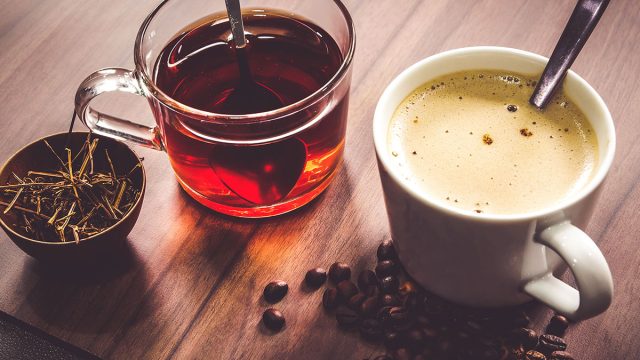Coffee and probiotics are always a hot topic for discussion among scientists and in the news. Some of you might take probiotics in your daily diet for a healthy gut and digestive system, but also love coffee.
The question is, does coffee kill probiotics? Is it safe to take coffee with probiotics?
Caffeine in coffee may stimulate your gastrointestinal tract, which causes abdominal cramping. It may lead to further irritation in your stomach lining.
So, Is it okay to have your cup of happiness with probiotics, or is it mismatched? Well, keep your assumption aside and read on to find all about probiotics and coffee.
Can I Take Probiotics After Drinking Coffee?
You can take your probiotics after a 1-2 hours gap of drinking coffee.
Plus, probiotics are most valuable when you take them on an empty stomach. When you take probiotics on an empty stomach, good bacteria reach your gut more quickly without any interruption from food or acidic drinks like coffee.
The ideal time to take your probiotics is either in the morning on an empty stomach or before you go to sleep.
Another factor that determines the best times depends upon the type of probiotic you are taking. It is helpful to read the packaging. Some companies mention that you could take the coffee with probiotics.
Research suggests that breakfast might be the ideal time of day. Why? That is because bacteria have the highest possibility of surviving the acidic conditions in the upper part of the gut and empty stomach.
That means you can take your probiotics before you brew your morning cup of coffee. But, please wait for at least 60 minutes after taking them before you reach for the cup of coffee.
Can You Take Probiotics With Hot Drinks?
You can take probiotics with a hot drink but it isn’t ideal. Not just with coffee, but also avoid taking your supplements with hot drinks or food.
As we now know, heat kills most types of probiotic bacteria. So, what you can do is wait for the coffee to cool down and come at the same temperature as your body temperature.
This way, you can assure that coffee you are going to enjoy will not kill your gut bacteria.
Those who prefer tea might need to be careful. Tea has tannins that bind with minerals: zinc and iron, decreasing their absorption in the body. Coffee also has tannins but in less amount compared to tea.

That being said, whether it’s coffee or tea, taking probiotics before 30 to 60 minutes is the best approach.
What Interferes with Probiotics?
I learned a hot cup of coffee and tea can interfere with probiotics. But do you know certain types of food also disturb the function of most probiotic bacteria?
Probiotics alone won’t do the job of keeping your digestive tract healthy. A combination and balance of healthy diet and lifestyle changes along with probiotics will do wonders.
Before you plan out a healthy diet for a healthy gut, here is a list of food you need to avoid as they can interfere with the probiotics.
Processed Food
The wide variety of packaged food you can find on the aisle of your local supermarket can interfere with your probiotics and gut system.
Chips, cookies, cakes, crackers are all processed food loaded with preservation and unhealthy additives for you and your minor gut system.
What do these processed foods do? They create an imbalance between harmful and good bacteria in your gut flora and destroy the healthy bacteria in your gut system. Plus, they have been stripped of fiber and have nothing to offer in terms of nutrients.
The first thing you need to change in your diet is replacing all kinds of processed and junk food with whole and natural products such as fruits and vegetables.
Red Meat
Red meat can interfere with gut health. Choline is red meat nutrition that produces harmful bacteria in the gut flora. These substances make arteries go harder, which leads to heart problems.
Eating a lot of meat 2-3 times a week can increase the chances of making more bad bacteria in gut bacterial composition than good bacteria.
Carbonated Drinks
We all know how unhealthy most carbonated drinks are. It’s okay to enjoy one or two in a week, but going overboard with regular consumption will only end up harming your health and digestive system.
If you think switching from regular to diet cola will work, then sorry to burst your bubble but these diet-labeled beverages are as dangerous as regular ones.
These beverages contain sugar substitutes: aspartame and sucralose, which have harmful effects. When you consume drinks with sugar and artificial sweeteners, they act as the source of food for harmful bacteria in your gut. Then it helps the bad guys grow more and kill probiotic bacteria.
Gluten-Rich Foods
When you search about a healthy diet, you might have come across many gluten-free diets. Gluten reputation is not good when it comes to people with coeliac disease. People develop sensitivity to components in gluten-rich foods that create imbalance(more harmful bacteria, less good bacteria) in gut flora.
There is no detailed research about gluten being the devil for human health, but it does affect some people, especially those who consume more gluten-rich food daily.
Refined Oils
Don’t be scared! I am not going to ask you to cook your food in water, but do you know there are two types of oil? Healthy and Unhealthy. Choose the healthy one!
Highly refined oil such as canola, soybean, sunflower, corn, and safflower can inflame the gut flora. These oils don’t even provide essential omega-3 fatty acids, which are vital to the human body.
These oil do nothing but damage the lining of the intestine. It would help if you opted for healthy options like olive oil, coconut, and avocado oil.
GMO Products
GMO products can also interfere with probiotics it negative effect has been proved through research. Still, we don’t have clear studies about how GMO foods interfere with your digestive system.
GMO food grows using herbicides that harm your gut system. Plus, their genetic alternation also impairs the functions of good bacteria.
Please read the package label. Some companies use GMO-free on their package. However, relying on the product label is not enough, so it is better to research GMO foods if you plan to clean your diet correctly.
To ensure that the probiotics you are taking works properly, kindly eliminate all these dangerous foods from your diet.
How Does Coffee Affect Probiotics?

In general, coffee doesn’t affect probiotic bacteria, but hot coffee can kill probiotics if taken immediately after taking probiotics.
Here is what people get confused about – it is not coffee or caffeine, but hot beverages or hot water that can damage the function of probiotics. In fact, there has been news about probiotic coffee with around 1 billion units of probiotics!
Probiotic bacteria work by lining the gut and colonizing there to kill the harmful bacteria. That’s how it improves overall health.
Probiotics help to:
- Assist indigestion
- Reduce the growth of harmful bacteria
- Slow down the growth of yeast in the body
- protect your intestines
- Lessen cholesterol
- Increase vitamins and minerals absorption
- Boost the immune system
- Reduce the risk of cancer
- Help the body produce vitamins such as biotin, and vitamin B6
- Regulate pH value
- Reduce cholesterol
- Reduce depression
Coffee produces acid in the stomach. Too much of that can harm if left unchecked.
What you should be worried about is that too much coffee can lead to:
- Nervous system stress
- Catabolic muscle breaks down.
- Cortisol Levels
- Adernal Gland Burnout
- Insulin Resistance
A recommended and healthy dosage of 3-4 cups a day is what you need to follow in your daily diet.
Check out Amazon for the best deals on probiotics:
Let’s look at the table below to check what is good and wrong when it comes to probiotics.
| Hot Drinks Checklist | Good or Bad |
| Taking probiotics with cold coffee or water | Fine ( Wait at least 30 minutes to take any hot beverage) |
| Mixing your probiotics capsule or sachet into your hot cup of coffee or tea | Bad |
| Taking probiotics with a hot drink: coffee or tea | Fine, but not recommended |
| Take probiotics with cold coffee or water between sipping on your cup of coffee (Room temperature) | Good |
| Take probiotics with after or cold drinks and then wait for an hour to enjoy your coffee | Perfect! |
Final Thoughts
Coffee is not bad for the gut, but to be precise about it, coffee helps maintain a healthy gut system. You can read about it here to know more, but in summary, coffee produces stomach acid that helps digest food. Plus, coffee increases the diverse microbiome in your gut flora, beneficial for your overall digestive system.
Watch the video below to learn more about the side effects of coffee on your good gut bacteria.
People with a healthy gut can consume coffee daily without a second thought. However, people with heartburn or IBS issues should avoid coffee as it can worsen the condition by irritating the gut lining.
So, coffee is good for your gut if you consume it in a considerable amount.
Other Articles
- Does Coffee Kill Testosterone? (Shocking Answer)
- Does Coffee Flush Out Your System? (Detailed)
- Does Coffee Contain Antioxidants? (Interesting Facts)
Contents


